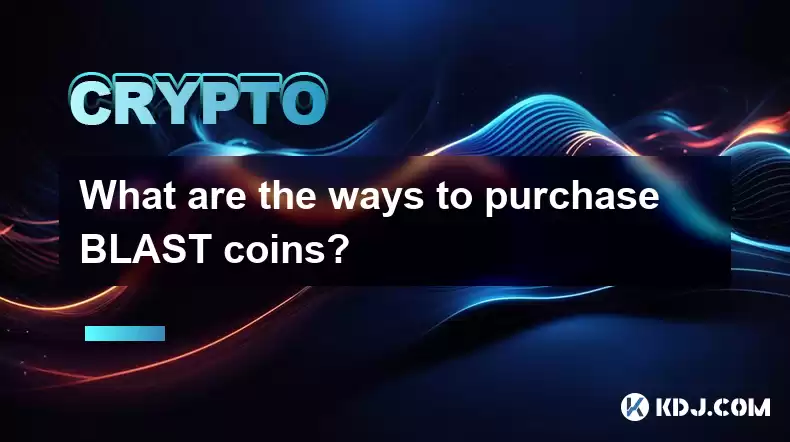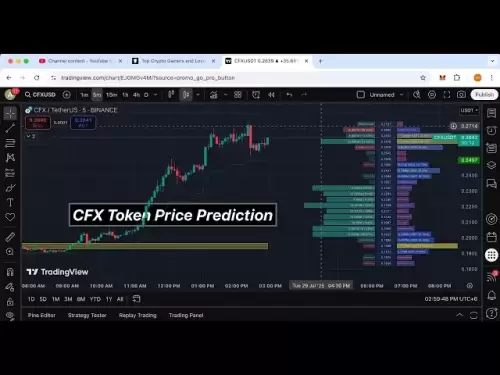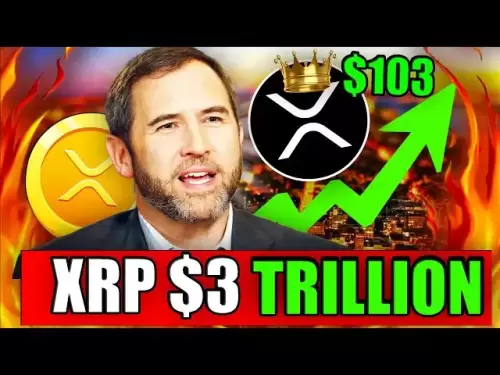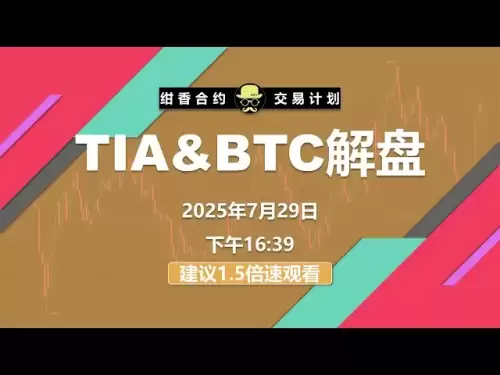-
 Bitcoin
Bitcoin $117500
-0.66% -
 Ethereum
Ethereum $3760
-1.24% -
 XRP
XRP $3.087
-2.54% -
 Tether USDt
Tether USDt $0.9999
-0.01% -
 BNB
BNB $803.6
-4.03% -
 Solana
Solana $180.3
-4.15% -
 USDC
USDC $0.9998
-0.01% -
 Dogecoin
Dogecoin $0.2218
-4.92% -
 TRON
TRON $0.3366
3.71% -
 Cardano
Cardano $0.7785
-3.73% -
 Hyperliquid
Hyperliquid $42.90
-4.75% -
 Sui
Sui $3.797
-7.45% -
 Stellar
Stellar $0.4165
-2.32% -
 Chainlink
Chainlink $17.65
-4.17% -
 Bitcoin Cash
Bitcoin Cash $561.0
-3.86% -
 Hedera
Hedera $0.2611
-4.54% -
 Avalanche
Avalanche $24.33
-7.02% -
 UNUS SED LEO
UNUS SED LEO $8.972
0.06% -
 Litecoin
Litecoin $107.6
-2.79% -
 Toncoin
Toncoin $3.254
-1.84% -
 Shiba Inu
Shiba Inu $0.00001306
-4.69% -
 Ethena USDe
Ethena USDe $1.001
0.00% -
 Uniswap
Uniswap $10.10
-4.83% -
 Polkadot
Polkadot $3.902
-4.63% -
 Monero
Monero $315.1
-2.57% -
 Dai
Dai $1.000
0.02% -
 Bitget Token
Bitget Token $4.499
-2.53% -
 Pepe
Pepe $0.00001145
-7.38% -
 Cronos
Cronos $0.1479
6.07% -
 Aave
Aave $281.3
-4.07%
What are the ways to purchase BLAST coins?
For maximum ease of use and instant transactions, purchasing BLAST coins through a centralized exchange like Gate.io or OKX is recommended.
Jan 05, 2025 at 04:46 pm

Key Points:
- BLAST coins can be purchased through centralized exchanges such as Gate.io and OKX.
- Decentralized exchanges like Uniswap and PancakeSwap offer BLAST coin trading through liquidity pools.
- Direct purchase from the Blast Network website.
- OTC trading through private marketplaces.
Ways to Purchase BLAST Coins:
1. Centralized Exchanges:
Centralized exchanges like Gate.io and OKX act as intermediaries between buyers and sellers, ensuring secure transactions. They offer a wide range of cryptocurrencies and trading pairs, including BLAST coins.
Steps:
- Create an account on a reputable exchange supporting BLAST.
- Verify your identity and complete KYC/AML procedures.
- Fund your account using fiat currency or other cryptocurrencies.
- Search for BLAST trading pair (e.g., BLAST/USDT or BLAST/BTC) and place a buy order.
Pros:
- Easy and user-friendly platform.
- Instant execution of trades.
- Wide range of trading pairs available.
Cons:
- May require KYC/AML verification, which can delay trading.
- Transaction fees can vary depending on the exchange.
2. Decentralized Exchanges (DEXs):
Uniswap and PancakeSwap are popular DEXs where users can directly trade crypto assets through automated liquidity pools.
Steps:
- Connect your wallet to the DEX's platform.
- Access the liquidity pool for BLAST trading (e.g., BLAST/ETH or BLAST/BNB).
- Specify the amount of BLAST you want to purchase and confirm the trade.
Pros:
- Non-custodial, meaning you maintain control of your funds.
- Anonymity and privacy.
- Equal access to trading pairs.
Cons:
- Limited order types and trading options.
- Potential slippage and price volatility during trades.
3. Direct Purchase from Blast Network:
The Blast Network website offers direct purchase of BLAST coins using fiat currency or cryptocurrencies.
Steps:
- Visit the Blast Network website and select "Buy BLAST."
- Choose your preferred payment method (fiat or crypto).
- Enter the amount of BLAST you want to purchase and follow the instructions provided.
Pros:
- Direct and convenient purchase from the source.
- Support for multiple payment options.
Cons:
- May require KYC/AML verification for certain payment methods.
- Limited flexibility in setting trade price.
4. OTC Trading:
Private marketplaces like over-the-counter (OTC) brokers enable large-scale trades of BLAST coins without impacting the market price.
Steps:
- Find a reputable OTC broker supporting BLAST trading.
- Contact the broker and negotiate the trade terms (price, quantity, time frame).
- Finalize the transaction and settle payment through the broker's platform.
Pros:
- Facilitates large-volume trades without market impact.
- Customized trading conditions.
- Confidential and discreet transactions.
Cons:
- Limited access to OTC marketplaces.
- Potentially higher trading fees.
- Counterparty risk involved in trusting the broker.
FAQs:
1. What is the best way to purchase BLAST coins?
The best purchase method depends on your individual preferences and requirements. Centralized exchanges offer ease of use and instant transactions, while DEXs provide anonymity and non-custodial trading. Direct purchase from Blast Network is simple and supports various payment options. OTC trading is suitable for large-volume trades and customization.
2. Can I purchase BLAST coins using fiat currency?
Yes, you can purchase BLAST coins using fiat currency on centralized exchanges and through the Blast Network website. Some DEXs may also allow fiat currency purchases through integrated services.
3. Are there any fees associated with purchasing BLAST coins?
Yes, most exchanges and platforms charge fees for trading cryptocurrencies, including BLAST coins. These fees can vary depending on the platform, transaction type, and market conditions.
Disclaimer:info@kdj.com
The information provided is not trading advice. kdj.com does not assume any responsibility for any investments made based on the information provided in this article. Cryptocurrencies are highly volatile and it is highly recommended that you invest with caution after thorough research!
If you believe that the content used on this website infringes your copyright, please contact us immediately (info@kdj.com) and we will delete it promptly.
- FaZe Banks, MLG Coin, and Resignation: What the Heck Happened?
- 2025-07-30 00:50:13
- Americans, Grocery Costs, and the Great Coin Phase Out: Are You Ready?
- 2025-07-30 00:50:13
- Bitcoin Swift Presale Heats Up: A New Era of Blockchain Utility?
- 2025-07-29 22:50:13
- Google Workspace Tackles Token Stealing: A Security Update You Can't Ignore
- 2025-07-29 22:55:13
- Trader's Guide: Navigating Bitcoin, Solana, and the Altcoin Maze
- 2025-07-29 22:30:12
- Bitcoin Reserve: How Corporate Treasuries are Diving into Digital Assets
- 2025-07-29 22:30:12
Related knowledge

What is Chainlink (LINK)?
Jul 22,2025 at 02:14am
Understanding Chainlink (LINK): The Decentralized Oracle NetworkChainlink is a decentralized oracle network designed to bridge the gap between blockch...

What is Avalanche (AVAX)?
Jul 22,2025 at 08:35am
What is Avalanche (AVAX)?Avalanche (AVAX) is a decentralized, open-source blockchain platform designed to support high-performance decentralized appli...

What is Polkadot (DOT)?
Jul 19,2025 at 06:35pm
Understanding the Basics of Polkadot (DOT)Polkadot (DOT) is a multi-chain network protocol designed to enable different blockchains to transfer messag...

What is Litecoin (LTC)?
Jul 23,2025 at 11:35am
Overview of Litecoin (LTC)Litecoin (LTC) is a peer-to-peer cryptocurrency that was created in 2011 by Charlie Lee, a former Google engineer. It is oft...

What is Monero (XMR)?
Jul 21,2025 at 10:07am
What is Monero (XMR)?Monero (XMR) is a decentralized cryptocurrency designed to provide enhanced privacy and anonymity for its users. Unlike Bitcoin a...

How to add indicators to Ethereum chart on TradingView?
Jul 19,2025 at 07:15am
What Is an Ethereum Chart on TradingView?The Ethereum chart on TradingView is a visual representation of the price movement of Ethereum (ETH) over a s...

What is Chainlink (LINK)?
Jul 22,2025 at 02:14am
Understanding Chainlink (LINK): The Decentralized Oracle NetworkChainlink is a decentralized oracle network designed to bridge the gap between blockch...

What is Avalanche (AVAX)?
Jul 22,2025 at 08:35am
What is Avalanche (AVAX)?Avalanche (AVAX) is a decentralized, open-source blockchain platform designed to support high-performance decentralized appli...

What is Polkadot (DOT)?
Jul 19,2025 at 06:35pm
Understanding the Basics of Polkadot (DOT)Polkadot (DOT) is a multi-chain network protocol designed to enable different blockchains to transfer messag...

What is Litecoin (LTC)?
Jul 23,2025 at 11:35am
Overview of Litecoin (LTC)Litecoin (LTC) is a peer-to-peer cryptocurrency that was created in 2011 by Charlie Lee, a former Google engineer. It is oft...

What is Monero (XMR)?
Jul 21,2025 at 10:07am
What is Monero (XMR)?Monero (XMR) is a decentralized cryptocurrency designed to provide enhanced privacy and anonymity for its users. Unlike Bitcoin a...

How to add indicators to Ethereum chart on TradingView?
Jul 19,2025 at 07:15am
What Is an Ethereum Chart on TradingView?The Ethereum chart on TradingView is a visual representation of the price movement of Ethereum (ETH) over a s...
See all articles

























































































